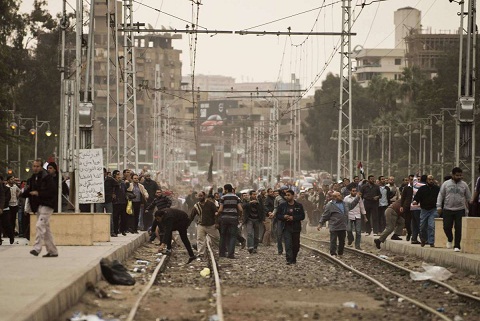
(AFP Photo)
The uninterrupted occupation is the key factor affecting the situation in the Gaza Strip, said Egyptian Ambassador to Palestine Nasr El-Din Ateya in a statement to Palestinian news agency Ma’an.
“It is unfair to focus on the one border [shared] with Egypt and overlook who is really responsible for the crisis, since there are six shared borders between the Gaza Strip and Israel,” said Ateya in the statement on Tuesday by Egypt’s Foreign Ministry.
The ambassador added it is known that there is an “exceptional situation” in the Sinai Peninsula, which requires special security procedures to combat terrorism.
“We are very keen on balancing between Egyptian national security needs and alleviating the suffering of our families and brothers in Gaza,” Ateya added.
The power shift that swept Egypt in July was followed by a rise in insurgency in the Sinai Peninsula and a drastic change in Egypt’s Rafah border crossing policy.
For the past 11 months, Egyptian authorities have repeatedly closed the border crossing, with each period of closure increasingly longer. During these periods, an already dire situation in the strip, home to 1.8million people, has worsened. The May report by the United Nations Office for the Coordination of Humanitarian Affairs said: “10,000 people are registered and waiting to cross into Egypt, including medical cases, students and holders of visa to third countries.”
The healthcare system in Gaza operates under limited capacity since it has a shortage of medication, knowledge and healthcare professionals, making treatment outside a necessity.
According to a report released by the World Health Organisation on 10 June, prior to July 2013, 4,125 patients used to cross Rafah per month, with patients being 20 percent of total travellers.
The report states that patients’ priority “dropped with the closure to only 5% of travellers. In early 2014, less than 50 patients per month have been able to cross on the few days the border is open. In April, only seven patients could cross.”
Ateya said no one in the region will hesitate to support Palestinian reconciliation, once there is an internal political will. He added that Egypt supports the Palestinian people under the umbrella of the unity government and their only “legitimate representative”, the Palestinian Liberation Organisation, dominated by Fatah.
The interim government was formed on 2 June and has brought an end to a seven year divide between Palestinian factions Fatah and Hamas. Following an armed dispute between them in 2007, Hamas has ruled the Gaza Strip after seizing control of it with Fatah ruling the West Bank through the Palestinian Authority. Egypt has voiced support for the unity government, which was agreed upon on 23 April.
The ambassador said while regional developments affect the internal situation in Palestine, Palestinian power comes from within. This power will help them make gains in negotiations, leading to the establishment of a state based on the 1967 borders and with a capital in East Jerusalem.
Egypt’s Foreign Minister Nabil Fahmy met Palestinian President Mahmoud Abbas on Saturday. He said: “Egypt will spare no effort to help our Palestinian brothers to get their legitimate rights and establish their independent state.”
The ouster of Muslim Brotherhood politician and former president Mohamed Morsi last July was followed by increasing tensions in Cairo-Hamas ties. In March, an Egyptian court banned the group inside Egypt and ordered the confiscation of the group’s offices in Cairo. Hamas has strongly condemned the ruling and described it as unjustified.



